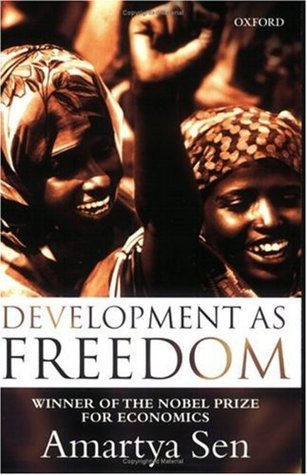
Development as Freedom
Amartya K. Sen
Publisher
Oxford University Press
Publication Date
1/1/2001
ISBN
9780192893307
Pages
384
Categories
Questions & Answers
Amartya Sen defines 'development as freedom' as the expansion of individuals' freedoms to lead the lives they have reason to value. He argues that development is not merely about economic growth but about overcoming various types of unfreedoms that limit people's choices and opportunities. Key components of this perspective include:
-
Freedom as the primary end and means of development: Sen emphasizes that the ultimate goal of development is to expand freedoms, particularly those that enable individuals to exercise their reasoning agency.
-
Capability deprivation as poverty: Sen defines poverty as the deprivation of basic capabilities, rather than just low income. This perspective focuses on the intrinsic importance of freedoms and the opportunities they provide.
-
Linkages between different types of freedoms: Sen argues that freedoms like economic, political, and social opportunities are interconnected and mutually reinforcing. For instance, education and healthcare can enhance economic and political participation.
-
Universalist assumptions: Sen believes that common values and commitments can be shared across cultures, emphasizing the importance of freedom as a universal principle.
-
Policy implications: Sen's approach suggests that policies should focus on enhancing freedoms and capabilities, rather than just economic growth, to achieve sustainable development.
In the context of development as freedom, political freedoms, social powers, and enabling conditions like health and education play crucial roles:
-
Political Freedoms: These include the right to participate in public discussions and decision-making. They are essential for preventing economic disasters like famines and ensuring that public policies address the needs of all citizens. Political freedoms enable citizens to hold their governments accountable and promote social change.
-
Social Powers: These encompass the collective ability of individuals to influence social norms and policies. Social powers are vital for fostering gender equity, improving child care, and addressing environmental concerns. They also enable communities to organize and advocate for their rights and needs.
-
Enabling Conditions: Health and education are fundamental for developing human capabilities. Good health allows individuals to lead fulfilling lives and contribute to society, while education equips them with knowledge and skills to participate in economic and political activities. These enabling conditions are essential for breaking the cycle of poverty and enhancing overall well-being.
Amartya Sen differentiates between the 'constitutive role' and the 'instrumental role' of freedom in the development process by emphasizing their distinct contributions to human well-being and progress. The 'constitutive role' of freedom refers to its intrinsic value in enriching human life. It encompasses basic freedoms like the ability to avoid deprivation, such as starvation, and enjoy education and political participation. These freedoms are essential for a fulfilling life and are considered the primary objective of development.
On the other hand, the 'instrumental role' of freedom focuses on how different types of freedoms contribute to the expansion of human freedom in general and thus to promoting development. This role involves the empirical connections between various freedoms, such as economic and political freedoms, which reinforce each other and enhance overall capabilities. Sen argues that while the constitutive role is foundational, the instrumental role is crucial for understanding how different freedoms interact and support each other in the development process.
Amartya Sen's capability approach to poverty and inequality emphasizes the importance of individuals' freedoms and opportunities to lead a fulfilling life. This approach differs from traditional income-based measures by focusing on the deprivation of basic capabilities rather than just low income. Key implications include:
-
Broader Perspective: Sen's approach considers a wider range of factors, like education, health, and social opportunities, that contribute to well-being, beyond just income levels.
-
Inequality of Capabilities: It highlights the importance of understanding and addressing inequalities in capabilities, which can lead to more profound deprivations than income alone.
-
Conditional Variations: The approach acknowledges that the relationship between income and capabilities can vary due to factors like age, gender, location, and health, making it crucial to tailor policies accordingly.
-
Policy Implications: It suggests that policies should aim to enhance capabilities and freedoms, not just increase income, to effectively address poverty and inequality.
-
Universalist Presumptions: Sen's approach assumes that common values and commitments exist across cultures, emphasizing the importance of cultural sensitivity in policy-making.
In summary, Sen's capability approach offers a more holistic understanding of poverty and inequality, emphasizing the importance of capabilities and freedoms, and advocating for policies that promote well-being beyond mere income levels.
Sen addresses the challenges and critiques of his freedom-based approach to development by emphasizing the importance of rationality, anticipating unintended consequences, and acknowledging the role of self-interest. He counters the Arrow theorem's perceived impossibility of rational social choice by highlighting the need for adequate informational bases for social judgments and decisions. He also disputes the idea that unintended consequences undermine rational assessment, emphasizing the importance of anticipating these effects. Regarding self-interest, Sen argues that while it is a significant motive, human behavior is also influenced by social values and moral reasoning. He distinguishes between sympathy and commitment, suggesting that both can be rational choices. Sen's approach thus integrates rationality, ethical considerations, and the complexities of human motivation to support his development model.